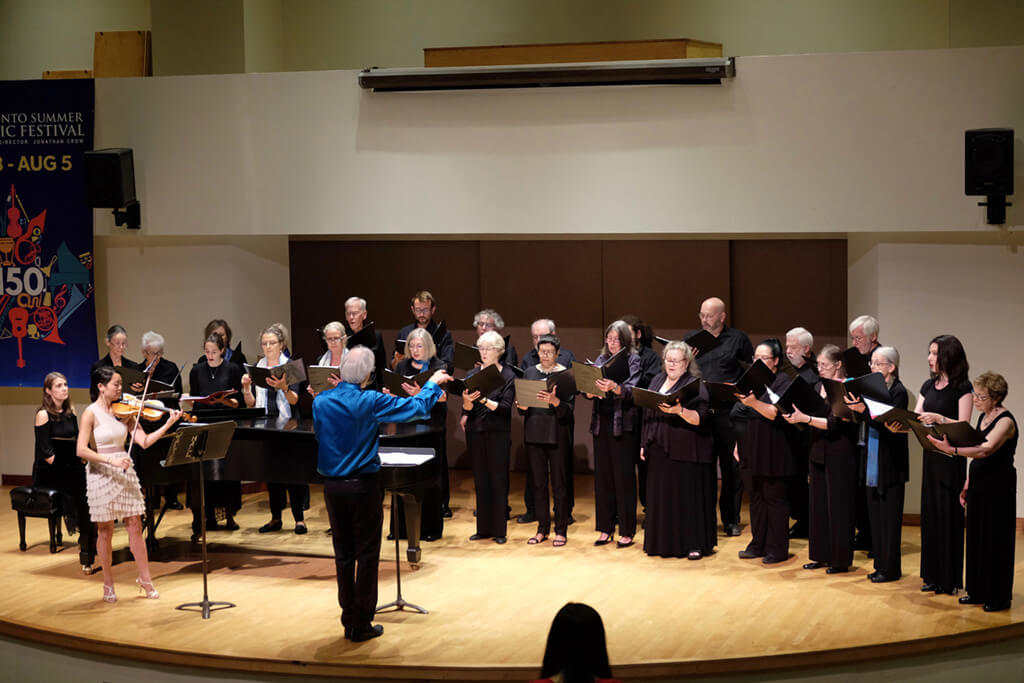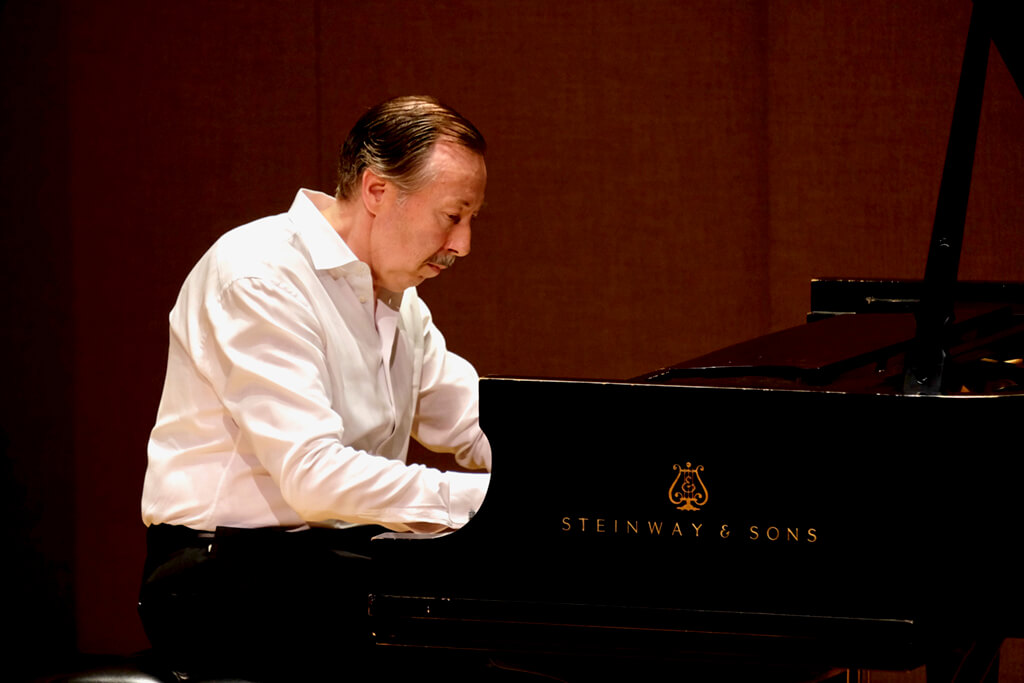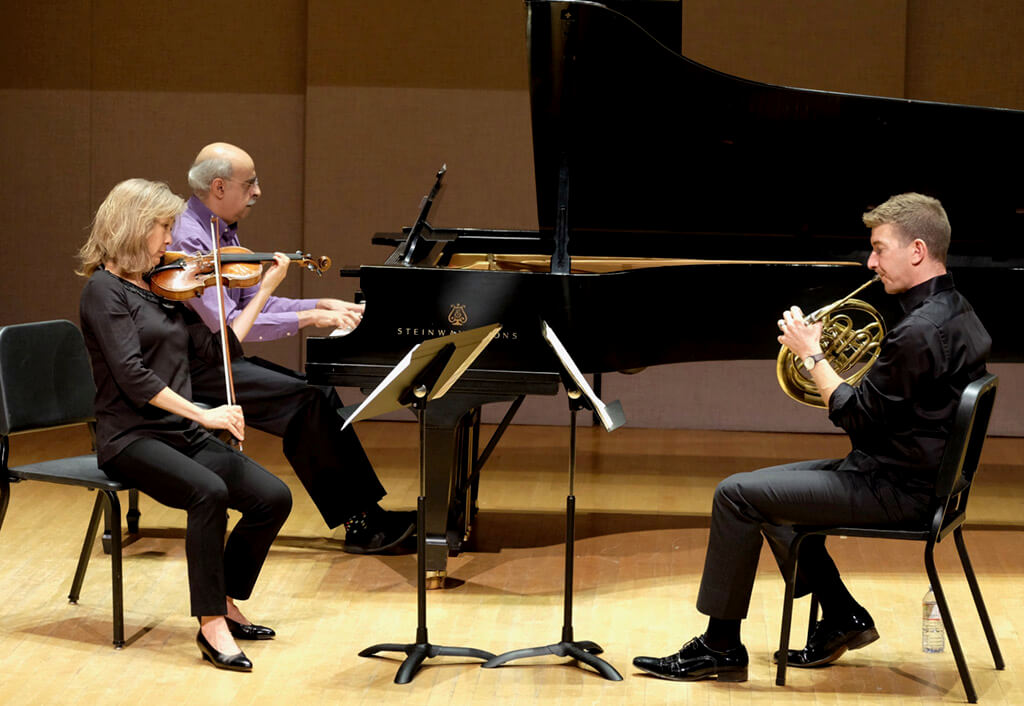
The Toronto Summer Music Festival’s opening night last week was a glamorous evening of world-class music followed by champagne and cupcakes in the elegant surroundings of Koerner Hall.
This week, there is a more down-to-earth, communal quality to the Festival, with most events at the Walter Hall of the Edward Johnson Building at the University of Toronto. This is where the separate programs of the Festival –the Academy for Emerging Artists, the Community Academy for Adult Amateur Musicians, and the free events for the public — are mostly located. It’s also where the ReGeneration Concerts, at which the emerging artists perform alongside their professional mentors, take place. At these concerts, all the members of the community come together.
At the first ReGeneration concerts last Saturday, there was a relaxed, familiar feeling in the audience, many returning from previous summers, recognizing familiar faces. When the young artists and their professional Mentors appeared the reunion feeling intensified. Many of the Academy fellows come back several summers in a row, so their developing comradery is visible and audible. The musicians speak to the audience about the pieces they are about to perform, share anecdotes, and express heartfelt gratitude to their coaches, adding a warm personal dimension to the experience. The chamber music mentors perform alongside the fellows they have been teaching, displaying the same standard of musicianship they’ve been demanding during their rehearsals and when they take their bows at the end it always looks to me as if they have a sense of pride in their students’ work. The collaborative pianists and their art song partners show genuine appreciation of each other.

Other members of the Festival community at these concerts include the hosts who billet the young musicians who come from such places as France, Germany, Korea, Rumania, the USA and the Philippines, and come to their performances with the proud air of surrogate parents. Many of the Academy fellows who aren’t on the program that day come to lend moral support to the ones who are, and they cluster around each other in triumph and relief in the hallways and lobby afterward. Performers in the first half of the program mingle during the intermission, chatting with audience members.
The audience also includes several of the amateur musicians who are going to be in Community Academy during the third week of the Festival. These advanced amateur musicians, who are now in the final stages of preparing the pieces they will be working on with their instructors from July 30 to August 4 chat about what they are practicing, musical challenges of these pieces, which mentors will be coaching this year, and more.

The Community Academy was added to the Festival four summers ago, to give serious amateur musicians the chance to learn from top-tier professional musicians. The success of the program is evident in the fact that the first three years of funding by the Metcalfe Foundation ended last year, and now it is fully self-funding.
“The Community Academy is an initiative that doesn’t rely on government or donor support, but still manages to expand our footprint in the local community,” Jonathan Crow told me in an e-interview this week. This is a testament to both the quality of the program and the serious financial and musical commitment made by these amateur musicians who prepare virtuosic works in their spare time during the rest of the year. At $950 for the piano master class and the chamber music program, and $750 for the chamber choir, the tuition is not exactly pocket money.
In any given year nearly half the participants are returnees and half are newcomers. Participants frequently express the pleasure they get from being with other musicians, professional and amateur alike. Darius Bagli, returning for his fourth year, to play piano in the Brahms clarinet trio and the Brahms G Minor Piano Quartet feels that “the coaching epitomizes the collaborative spirit of what chamber music making is all about.” Four-year veteran Doug Freake, who is polishing a Chopin Nocturne and a Mozart Sonata for the piano master class comments that “’I’ve especially valued the comradery that develops among members of the group (usually not more than ten people) during the weeks of intense concentration on piano playing. I haven’t noticed any examples of unseemly rivalry or competitiveness, just mutual support.”
The Community Academy wraps up with a marathon concert in Walter Hall on the last day of the Festival. Crow added this event last year, as a way to “make sure the Community Academy is fully integrated into our festival by having the Community Academy players perform in concerts side by side with professionals and young musicians from our emerging artists program.”
Daunting as it is, the concert provides a chance to feel what it’s like to be a real professional and for everyone to give each other the recognition they deserve for what they’ve achieved. For many, including Ann Sublett who spontaneously stepped up at the 2015 final concert to replace another pianist who couldn’t be there, the performance is “One of the highlights. It was nerve-wracking, but a lot of fun.” Stuart Mutch, the cellist who will play the Brahms clarinet trio and the G minor quintet with Darius Bagli, is preparing to perform, as he did in 2015 and 2016, with a mature attitude: “While there will inevitably be some stuff I do that I am not happy with, I hope not to screw up in any big way! I realize it is not exactly a career highlight for the pros to play with people who have other professions and who have made music a second to their working lives and I really appreciate their willingness to share their very high level of musicianship and expertise and give us an experience we would otherwise not have – and just plain put up with our fumbles!”
While the heart of the Toronto Summer Music Festival are the concerts and performances, the presence of a community of highly committed music learners, and equally engaged music teachers, adds a buzz that occurs whenever people are being challenged mentally and artistically.



